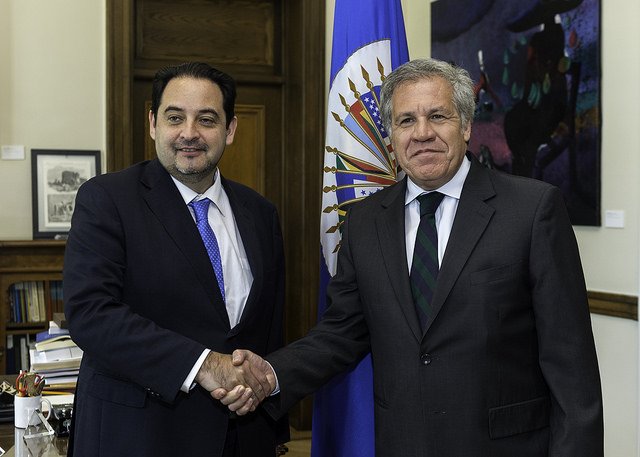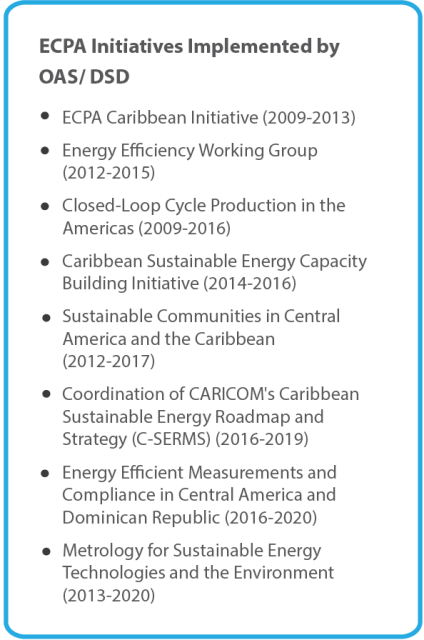
 For almost a decade, the Department of Sustainable Development of the Organization of American States has managed several projects under the ECPA umbrella to support national and regional energy priorities in energy efficiency, metrology, and donor coordination.
For almost a decade, the Department of Sustainable Development of the Organization of American States has managed several projects under the ECPA umbrella to support national and regional energy priorities in energy efficiency, metrology, and donor coordination.
Economic growth in the countries of Latin America and the Caribbean is driving an increase in the demand for energy, which is expected to rise by 20% by the end of the decade. With respect to electricity generation, although the region’s matrix is one of least polluting in the world, the non-renewable resources portion of the energy mix is steadily increasing. That shift poses considerable challenges from the resources perspective. Indeed, unless there is a shift in current energy generation trends, the decline in conventional oil reserves could become cause for concern from 2030 onward.
The need to spur social and economic development in the Americas while ensuring secure and stable energy access, modernizing infrastructure, and fostering jobs connected with new generation, transmission, and distribution technologies, must be combined with the inevitable environmental challenges posed by new energy scenarios in which the share of renewables will take center stage. In this context, implementing successful energy strategies that benefit current and future generations becomes a priority.
In 2010, the OAS provided technical assistance in geothermal energy to Chile, Colombia, Costa Rica, Ecuador, El Salvador, and Peru in order to support their use of geothermal energy. In 2011, the OAS, in coordination with the Energy Secretariat of Mexico and the U.S. Department of State, launched an Energy Efficiency Working Group to provide policy, regulatory, and technical assistance for the advancement of energy efficiency and conservation.
Through its Sustainable Cities Program, since 2012 the OAS has supported the work of 24 governments, universities, and NGOs across the Americas dedicated to the advancement of sustainable land management and urban development. The Sustainable Cities Program also held 13 courses with a total of 1,200 graduates. In 2012, the OAS pioneered the field of circular economy with the launching of pilot projects showcasing sustainable consumer product design and manufacturing methods in Colombia, Ecuador, Panama, and Trinidad and Tobago. In 2013, the OAS developed clean energy and energy efficiency education materials for middle schools across the Caribbean. That same year, the OAS supported the Caribbean in addressing critical commercialization challenges associated with the expansion and use of renewable energy. Since 2013, the OAS implements a metrology project to support the use of reliable measurement standards in renewable energy. Since 2016, the OAS works alongside its Caribbean member States to implement the Caribbean Sustainable Energy Roadmap and Strategy (C-SERMS), and thus support a transition toward enhanced energy services. In 2016, the OAS launched a project to support energy efficiency measurement and compliance in Central America and the Dominican Republic.
These projects are a testament to the OAS’ commitment to advancing energy security through sustainability, integration, market transformation, and diversification.
 View Map
View Map